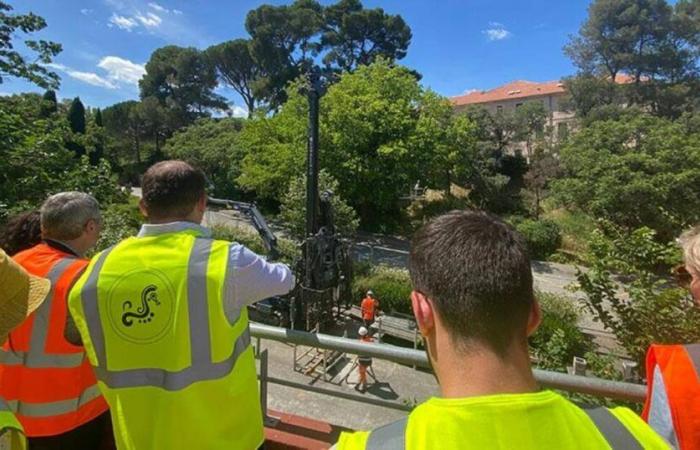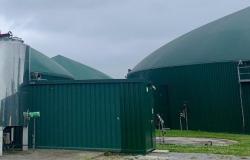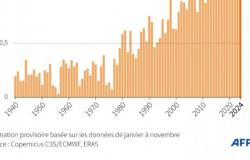
On its vast campus in downtown Montpellier, the Agro Institute has equipped itself with surface geothermal energy to heat thirteen of its buildings in winter and cool in summer. Local and economical green energy.
It is cold, less than 10 degrees in the city center of Montpellier, this morning of December 5, but almost 200 meters underground, the temperature is 15°, constant all year round. An advantage of geothermal energy, chosen for heating in winter and cooling in summer by the Institut Agro, a large public school of agriculture, food and the environment located on a huge campus of thirty hectares.
Beneath our feet, a distribution chamber, a cavity set up in the basement where the geothermal probes are installed. “There are 44 probes in the boreholes that we dug vertically, to an average depth of 190 meters”details Victor Mendes, Dalkia business manager, responsible for the site. On the ground, trenches are still visible, where drills have made thin holes in the ground. Not easy, in the clayey soil. “Imagine that you are at the beach and you dig a hole in the sand…, it very quickly fills with grains of sand”illustrates the thirty-year-old with the white helmet, orange vest and safety shoes.
The keystone of this system is hidden in a technical room, on the ground floor of a building of the public higher education establishment. There, a huge heat pump has recently been enthroned, connected to the field of probes by two large pipes, still in the testing phase. “It transfers the heat drawn from the ground to the buildings to be heated by raising the temperature of the existing network”explains Victor Mendes. It thus returns at least four times more energy than it consumes. Conversely, in the summer, it evacuates the heat coming from the buildings towards the ground.
Thanks to centralized management, this green energy will serve, from the end of the year, thirteen buildings previously heated with gas, which represent a third of the campus’s energy consumption. “We replace gas with heat coming from the ground for 90% of heating needs”specifies Laurent Mussot, from the heritage department of the Institut Agro. Geothermal energy will also cover 76% of air conditioning needs. Either “a total saving of 450 Megawatts on primary energy”he adds. A big step towards reducing energy consumption (-40% by 2030). The vast campus, where the National Institute for Research in Agriculture, Food and Environment (INRAE) is also located, is all the more relevant as it houses mills, a large greenhouse and energy-intensive laboratories, in addition to numerous offices, teaching rooms and student accommodation.
But nothing could have been done without significant subsidies, in these times of severe budgetary restrictions in the public sector. The investment of two million euros in geothermal energy is financed by the Ecological Transition Agency (Ademe) to the tune of 700,000 euros and the State Real Estate Department (450,000 euros). Dalkia, with which the Institut Agro signed an energy performance contract, carries the rest of the financing. To reimburse him, the higher education establishment pays him an investment fee for sixteen years.
Despite high investment costs, geothermal energy has incomparable advantages: it is a local, invisible, economical, very efficient and sustainable resource, according to Ademe. To the point that the enthusiasm for this green energy continues in the tertiary sector, from collective housing to hospitals, including office buildings and retirement homes. The metropolis of Montpellier has just equipped its new Cambacérès district, intended to house 450,000 m² of tertiary buildings, with an underground geothermal power plant. The first buildings served are those of the Sud de France station and the Halle de l’innovation which houses start-ups. The investment of 17.5 million euros is financed for a quarter by Ademe. To, here too, blow the heat, in winter, and the cold, in summer.





